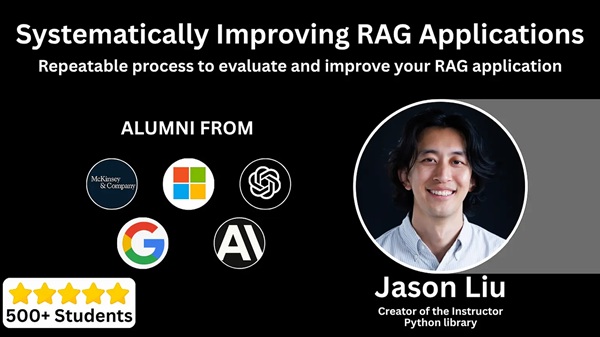[GroupBuy] Systematically Improving RAG Applications – Jason Liu
$1,800.00 Original price was: $1,800.00.$69.00Current price is: $69.00.
- Delivery: You Will Receive A Receipt With Download Link Through Email.
- If you need more proof ofcourse, feel free to chat with me!

Description
Table of Contents
ToggleProof of payment:

This article delves into the Systematically Improving RAG Applications rag course offered by Jason Liu on Maven, exploring its methodologies, frameworks, and the transformative potential it holds for AI practitioners seeking to elevate their Retrieval Augmented Generation systems.
Rag Course
This rag course, taught by Jason Liu, offers a pathway to move RAG systems from impressive demos to robust, production-ready solutions that deliver tangible business outcomes. The course tackles the common problem of RAG implementations getting stuck in the prototype phase, where they perform well in simple scenarios but struggle with complex queries, leading to hallucinations, manual information retrieval, and a lack of measurable improvement.
By focusing on a systematic, data-driven approach, the course aims to equip participants with the tools and knowledge to build RAG systems that are accurate, adaptable, and continuously improving. This ensures that the immense potential of RAG is fully realized, transforming it from a promising technology into a mission-critical asset. Let’s delve deeper into the core themes and methodologies that make this course so impactful.
The Core Problem Addressed in the Rag Course: Prototype Purgatory.
The challenge of transitioning from a successful RAG prototype to a production-ready system is a hurdle that many AI engineers face. Prototypes often thrive in controlled environments with carefully crafted queries and curated data. However, the real world presents a much more complex and unpredictable landscape. User queries are ambiguous, data is noisy and diverse, and the system is expected to perform consistently across a wide range of scenarios. This is where many rag course implementations falter, leading to a state of “prototype purgatory.”
The consequences of this stagnation are significant. When RAG systems fail to retrieve the correct information or generate accurate responses, users are forced to revert to manual search, negating the benefits of automation. Hallucinations, where the system generates incorrect or nonsensical information, erode trust and undermine its credibility. Furthermore, the lack of measurable improvement makes it difficult to justify continued investment and development. Without a clear understanding of what is failing and how to fix it, engineers resort to ad-hoc prompt engineering, hoping to stumble upon a solution. This approach is not only inefficient but also unsustainable.
The rag course directly addresses this issue by providing a systematic methodology for identifying and addressing the weaknesses of RAG systems. It emphasizes the importance of data-driven decision-making, enabling engineers to move beyond guesswork and make targeted improvements that have a measurable impact on performance. By focusing on real-world scenarios and complex queries, the course equips participants with the skills and knowledge to build RAG systems that are not only impressive in demos but also deliver tangible business value in production. This holistic approach, from initial design to continuous refinement, is key to unlocking the full potential of RAG technology.
The RAG Flywheel Methodology: A Framework for Continuous Improvement.
At the heart of the Systematically Improving Rag Course Applications course lies the RAG Flywheel methodology. It’s designed to transform traditional, often stagnant, RAG implementations into self-improving, mission-critical systems. Picture a flywheel, requiring initial effort to get it spinning, but once it’s in motion, it leverages momentum to sustain and accelerate that motion. The RAG Flywheel mirrors this concept, creating a system that continuously refines itself based on user interactions, data analysis, and targeted improvements.
This methodology directly tackles the limitations of “good enough” RAG systems that often degrade over time due to evolving data and changing user needs. By embracing the Flywheel, participants learn to build RAG systems that:
- Consistently Retrieve Relevant Information: Even when queries are complex or even ambiguous.
- Continuously Improve: With each user interaction, the systems get better and better.
- Provide Clear Metrics: Demonstrating return on investment (ROI) to stakeholders with concrete data.
- Enable Data-Driven Decisions: Steering improvements based on analysis rather than gut feeling.
- Adapt to Diverse Content: Handling multiple content formats through specialized strategies.
- Create Compound Value: Value increases over time instead of degrading.
The RAG Flywheel isn’t just a set of best practices; it’s a fundamental shift in how RAG systems are approached. It moves away from one-time fixes and toward a mindset of continuous learning and optimization. Here, participants learn to harness the power of feedback loops, leveraging user signals and data analysis to drive iterative improvements and create RAG systems that are not only effective but also resilient and adaptable.
Key Frameworks Taught in the Rag Course: A Deep Dive.
The rag course meticulously dissects the RAG Flywheel into distinct, yet interwoven frameworks, each addressing a specific challenge within the RAG pipeline. These frameworks include The Improvement Flywheel (Evaluation Systems), Fine-tuning Framework, Feedback Acceleration, Segmentation System, Multimodal Architecture & Specialized Search and Query Routing. Each framework plays a vital role in the overall RAG Flywheel process, enabling engineers to systematically improve their RAG applications.
The Improvement Flywheel framework focuses on preemptively identifying weaknesses in your system, even before you have real user data. This is achieved through building synthetic evaluation data that pinpoints specific failure modes. Say you are struggling with what exactly to improve with the AI, this helps to identify the problem more exactly. The Fine-tuning Framework tackles the issues of generic embeddings failing to understand domain-specific language; participants discover how to create custom embedding models with minimal data. With the Feedback Acceleration framework, participants discover how to transform user interactions into signals that strengthen the system and greatly increase high-quality feedback.
The Segmentation System teaches how to analyze user queries to identify segments that are in need of specialized retrievers for accuracy gains. With the Multimodal Architecture & Specialized Search framework, participants learn how to go beyond simple text and how to implement specialized indices for different content types. Lastly, the Query Routing framework teaches how to create a unified system that intelligently selects the right retriever for each query.
Jasonliu
Jason Liu, the instructor of the Systematically Improving RAG Applications course, brings a wealth of experience and expertise to the table. His background in building AI systems for major tech companies like Facebook and Stitch Fix, coupled with his creation of the Instructor Python library, positions him as a leading voice in the field of Information Retrieval and AI. The course not only benefits from his deep technical knowledge but also from his practical understanding of the challenges and opportunities that arise when deploying RAG systems in real-world settings. His teaching style emphasizes hands-on learning, with interactive activities and project-based assignments that allow participants to apply the concepts they have learned and develop their skills in a practical, engaging way.
Jasonliu’s Background and Expertise in AI.
Jason Liu‘s impressive track record speaks volumes about his expertise in the field of AI. His experience at Facebook, a company at the forefront of AI research and development, provided him with invaluable insights into the challenges of building and scaling AI systems for a global audience. Similarly, his work at Stitch Fix, where he developed search and recommendation systems that boosted revenue by $50 million, demonstrates his ability to translate AI technology into tangible business value.
Beyond his professional experience, Jason Liu‘s creation of the Instructor Python library is a testament to his commitment to innovation and his passion for empowering other AI practitioners. The Instructor library simplifies the process of extracting structured data from language models, making it easier to build AI applications that can understand and respond to user requests.
Jason Liu‘s expertise extends beyond technical skills. He possesses a deep understanding of the strategic considerations involved in deploying AI systems, including the importance of aligning technology with business goals, measuring the impact of AI initiatives, and continuously improving performance based on user feedback. This holistic approach is reflected in the Systematically Improving Rag Course Applications rag course, which emphasizes the importance of data-driven decision-making, systematic improvement, and a focus on delivering real business value.
Course Structure and Learning Experience with Jasonliu .
The rag course, led by Jason Liu, features a well-structured curriculum designed to provide participants with a comprehensive understanding of the RAG Flywheel methodology and its practical application. The 6-week program combines live sessions, pre-recorded lectures, office hour Q&As, and hands-on Python notebooks to create an engaging and interactive learning experience.
The live sessions provide an opportunity for participants to interact directly with Jason Liu and their peers, ask questions, and share insights. The pre-recorded lectures allow participants to learn at their own pace, revisiting key concepts as needed. The office hour Q&As provide a forum for participants to address specific challenges and receive personalized guidance from the instructor.
The 12 hands-on Python notebooks are a central component of the course, providing participants with the opportunity to apply the concepts they have learned to real-world problems. These notebooks cover a range of topics, including evaluation systems, fine-tuning embeddings, feedback systems, query segmentation, multimodal architecture, and query routing. By working through these notebooks, participants gain valuable experience in building and deploying RAG systems that are accurate, adaptable, and continuously improving.
Beyond the core curriculum, the course also includes access to a lifetime Slack community, expert speaker library, guest lectures, over $2,000 in cloud and AI credits, free future re-enrollment, and a certificate of completion. These additional resources provide participants with ongoing support, access to industry experts, and opportunities to continue learning and developing their skills long after the course has ended.
Target Audience and Tangible Impact of Jasonliu’s Rag Course
The Systematically Improving Rag Course Applications rag course doesn’t cater to newcomers wading into the shallows of AI. Instead, the curriculum is meticulously designed for experienced product leaders, engineers, and data scientists who are ready to dive deep and transform their RAG prototypes into robust, scalable, production-grade AI solutions. The ideal participant possesses a firm grasp on LLM basics but seeks a repeatable, data-driven methodology to elevate crucial aspects of RAG: retrieval relevance, reduced latency, and vastly improved user experience.
The course emphasizes the creation of feedback loops that continuously refine and enhance the quality of RAG applications. Participants are eager to move beyond ad-hoc improvements and implement systematic processes that drive tangible results. The tangible impacts highlighted in the course are not mere hypotheticals; they represent real-world achievements attainable through implementing the RAG Flywheel methodology.
85% blueprint image recall *90% research report retrieval $50M revenue increase from enhanced product search +14% accuracy boost via fine-tuning cross-encoders +20% response accuracy using re-ranking *-30% irrelevant documents through improved query segmentation
These figures paint a clear picture: this course is about delivering quantifiable ROI. It’s about transforming RAG systems from interesting experiments into powerful engines of efficiency, accuracy, and revenue generation. The rag course aims to empower participants to not only build better RAG systems but also to demonstrate the value of those systems to their stakeholders, securing buy-in and driving further investment.
Conclusion
The Systematically Improving Rag Course Applications course, led by Jason Liu, presents a compelling and comprehensive approach to tackling the challenges of building production-ready RAG systems. By introducing the RAG Flywheel methodology and providing hands-on training in key frameworks such as evaluation systems, fine-tuning embeddings, feedback systems, query segmentation, multimodal architecture, and query routing, the course empowers participants to move beyond ad-hoc prototypes and create AI solutions that deliver tangible business value. The course’s focus on data-driven decision-making, continuous improvement, and real-world application makes it a valuable resource for product leaders, engineers, and data scientists looking to elevate their RAG skills and drive meaningful impact.
Sales Page:_https://maven.com/applied-llms/rag-playbook
Related products
-
Sale!

Newsletter Mastery Course Alex Brogan
$997.00Original price was: $997.00.$25.00Current price is: $25.00. -
Sale!

[SCAM or Legit] Adam Lucero – Superhuman Discipline System
$497.00Original price was: $497.00.$25.00Current price is: $25.00. -
Sale!

Billy’s 10-Day Business Blueprint AI Advantage
$199.00Original price was: $199.00.$23.00Current price is: $23.00. -
Sale!

Robby Blanchard Commission Hero AI
$997.00Original price was: $997.00.$39.00Current price is: $39.00.

Reviews
There are no reviews yet.